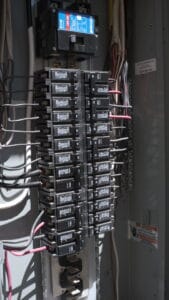Electrical Panel Swapping Companies in Las Vegas
Are you thinking of getting an electrical panel swap, repair, or upgrade in Las Vegas? In that case, there are a variety of things you should know about before you make the big decision, and also as you carry it out with the help of an expert.
First, you need to know how to spot the signs that you are in need of an electrical panel upgrade. If you have:
- faulty wiring
- dimming and flickering lights
- constant smell of burning wire in the house
- fuses, rather than circuit breakers
- lots of extension cords and power strips
- a new appliance getting installed soon
- plans to upgrade and renovate the entire house
then you may need to upgrade your electrical panel. The most important thing to get done first, when you get an electrician, is to ask for a load calculation. This will enable you to know just how much power you will need your new electrical panel to provide, and plan around that.
Electrical Panel Swaps: The Load Calculation
Ideally, the load calculation should be done before you do any major renovations or home additions. This is also true of when you’re adding appliances. Anything that adds square feet, energy consuming appliances, or both to the house will likely require a load calculation as it will involve higher power consumption.
Once the electrician carries out the load calculation, they will be able to determine whether you need an electrical panel swap or an entire rewiring of the house. For example, if your home is 2000 square feet, uses mainly gas appliances, and has heating, it may only need a 60 ampere service. On the other hand, if it is 2000 square feet, uses mainly electrical appliances, and has heating, it may need up to 200 amperes. This is a good reason why a load calculation is necessary. The size of the house does not tell you much about how much electricity it consumes. Only a load calculation will tell you that.
Don’t worry about the cost differences of different electrical panels as they are negligible. That said, it is probably a good idea to install a higher rated electrical panel than you home actually needs. For example, a load calculation may tell you that your home needs 115 amperes of service but the electrician may recommend getting a 200 ampere electrical panel.
The two main reasons for this are to allow for additional appliance installations in the future and also to meet insurance company, by-law, and local code regulations, many of which may have a minimum service size requirement.
Actual Electrical Panel Swaps
Sometimes your service is just fine, but you need extra circuit breakers or specialty breakers like the AFCI and GFCI. In that case, you may need a panel change, especially if your existing panel cannot accommodate those extra circuit breakers.
In the process of getting you an electrical panel swap, the electrician may renew the bonding and grounding by adding a ground plate outside the home or running a new wire to the water meter. They may also add bonding jumpers to the duct work, sewer line, gas line or water line.
What To Expect From an Electrical Panel Swap
If you’re planning on getting an electrical panel swap, there are a few pointers to bear in mind:
- Expect the power to be out for at least 4 hours. You should keep the doors of the refrigerator closed.
- Make sure to unplug all electronics during this period as the power will be repetitively turned on and off.
- Keep the worksite areas clear for the workers, especially since they will be dark due to lack of power.
The post What to Know About Having an Electric Panel Swap or Replacement appeared first on Callidus Electric.
from
https://calliduselectric.com/what-to-know-about-having-an-electric-panel-swap-or-replacement/?utm_source=rss&utm_medium=rss&utm_campaign=what-to-know-about-having-an-electric-panel-swap-or-replacement

No comments:
Post a Comment